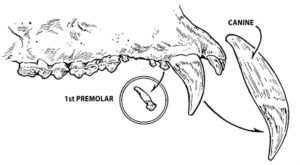Successful hunters are required to submit bear teeth
The Vermont Fish & Wildlife Dept. is reminding successful bear hunters that a regulation requires them to submit a bear tooth so wildlife managers can collect important information on Vermont’s bear population.

VT Fish & Wildlife requires hunters to send in the first pre-molar tooth from their bear. The tooth is small and easy to loosen with a knife.
The hunter must field dress the bear before taking it to a reporting station. It is also legal to skin the bear and cut it up in order to carry it out of the woods. Although the bear must be reported within 48 hours, Fish & Wildlife urges doing so quickly to cool the meat. The hunter must also collect and submit a pre-molar tooth from the bear at the time the bear is reported or within 30 days. The tooth provides important data on the age structure and size of the bear population.
Envelopes for submitting teeth are available at all big game check stations.
“Successful bear hunters will be helping in our management of this magnificent big game animal,” said Director of Wildlife Mark Scott. “The premolar tooth we’re asking hunters to extract is small and easy to loosen with a knife. Directions for removing the tooth are on the back of the envelope provided by the check station, and a short video showing tooth removal is found on our website by clicking on ‘Hunt’ and then ‘Black Bear.’”
Vermont has two bear hunting seasons. The early season, which requires a special bear tag, is from Sept. 1 through Nov. 12 with one exception: nonresident hunters using dogs cannot start bear hunting until Sept. 15. The late bear season begins Nov. 13 and continues through Nov. 21. A hunter may only take one bear during the year.
“Carefully regulated hunting plays a very important role in scientific wildlife management by helping to control the growth of Vermont’s bear population now estimated at being well within our population objective of 3,500 to 5,500 bears,” said Scott. “Minor fluctuations in the bear population will always occur due to changes in food availability, winter severity and hunter success. Despite these fluctuations, we look at the long-term trends to manage for a healthy, robust population.”




